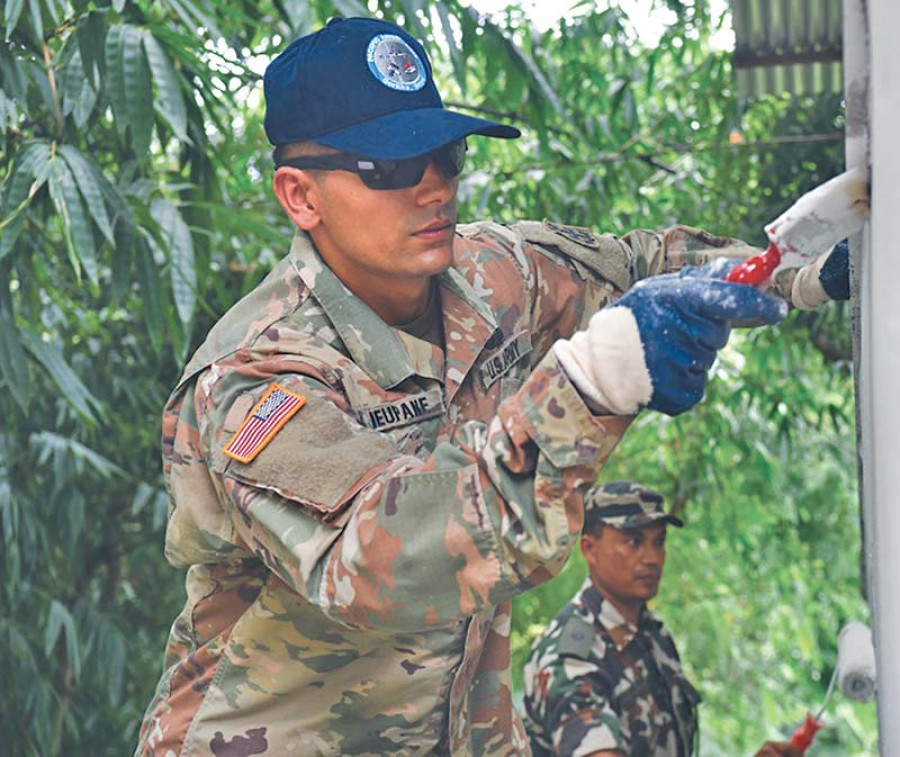National
Pacangel 17 operation provides some solace to Gorkha folk
Life in Gorkha Bazaar which lies around 45km south of Barpak—the epicentre of the 2015 Great Earthquake—may have returned to normalcy, but the scars of dreadful disaster remain.
Life in Gorkha Bazaar which lies around 45km south of Barpak—the epicentre of the 2015 Great Earthquake—may have returned to normalcy, but the scars of dreadful disaster remain.
A joint operation titled ‘Pacific Angel (Pacangel 17)’, conducted recently by the US Army, Air Force, Navy and Marine Corps along with Nepal Army (NA) officials at Gorkha, has found that people in the region have been suffering from a number of common health-related issues. A telltale sign of post-traumatic stress disorder, triggered by the 7.8 magnitude quake that claimed nearly 9,000 lives in the country, including 492 in Gorkha district.
Under the Pacangel 17, the US Pacific Command officials directed humanitarian assistance and civil operation mission, while the army officials from Bangladesh, Sri Lanka and Mongolia, together with those from the US and Nepal, ran a comprehensive health camp for a week.
Forty-two-year-old Khil Bahadur Thapa of Aam Dada, who visited the health camp with his family of three, suggested that people who had been forced to live under makeshift shelter even in extreme cold might be the cause behind severe issues related with stomach.
“I cannot say if staying under makeshift shelter is the sole reason behind it, but it has definitely had an impact,” said Thapa, whose house was destroyed in the earthquake. “I feel a mild ache in the stomach during cold and rainy days. My wife too has similar complaints.”
“We have found a common pattern in patients. Most of them have issues related with stomach, skin and optometry issues,” said NA Major Dr Rinku Joshi, who had examined a number of patients in the health camp.
Issues related with the eyes in particular were found to be severe compared to stomach and skin. “People, in general, aren’t aware about some of the issues related with the eyes,” she noted.
The patients have been provided with basic medicines and preventive measures during the camp to mitigate the impact, Joshi said. “This isn’t going to be enough, though. Periodic check-ups and follow-ups will be needed to get over these problems.”
Apart from running the health camp, the Pacangel 17 was also involved in activities like rebuilding infrastructure in the district.
A team of 15 NA engineers and 19 from the US Air Force was involved in renovating three schools, a hospital and a health post. The team built infrastructure like water tanks, classrooms and toilets, among others, at Shree Sharaswati School, Shree Mahendra Higher Secondary School, Shree Sansari Mahendra School, Chebetar Urban Health Centre and District Hospital in the district.
The engagement of soldiers in renovation works has a positive impact on the villagers, especially the children.
“For the first few days students found the presence of army personnel in the school a bit strange,” said Gopal Babu Marahatta, the principal of Shree Mahendra Higher Secondary School. “But soon they understood the purpose of the army officials’ visit to the school. And the friendly and helpful nature of the men in uniform won them over. Besides infrastructure, such events go a long way in building relationship and positive synergy between the general public and the security agencies.”
According to US Air Force Lt Col Gary Dodge, Gorkha was selected this time around after it came their notice that the district was in desperate need of humanitarian assistance after the disaster in 2015.
“This, for us, is interoperability exchange between the security forces of different nation. Apart from serving the society, such activities help maintain efficient coordination among armies during emergency situations,” said Dodge, hoping that the operation would help the locals in coming to terms with life after the disaster.
It was the third Pacangel operation held in Nepal in the past decade. The previous operations were conducted in Chitwan and Pokhara. Globally, it was one of the four humanitarian assistance engagements under Pacangel 17. Having conducted events also in Fiji and the Philippines earlier this year, the team is set to hold another in Vietnam this month.
NA Major Prakash Bahadur Singh, the coordinator of the Nepali side, explained that the event was also an opportunity for army officials to learn from each other. “Firstly, this event will help us maintain coordination in case of need in future. Secondly, we have exchanged thoughts, ideas and ways to address such situations,” Singh said.




 9.89°C Kathmandu
9.89°C Kathmandu













